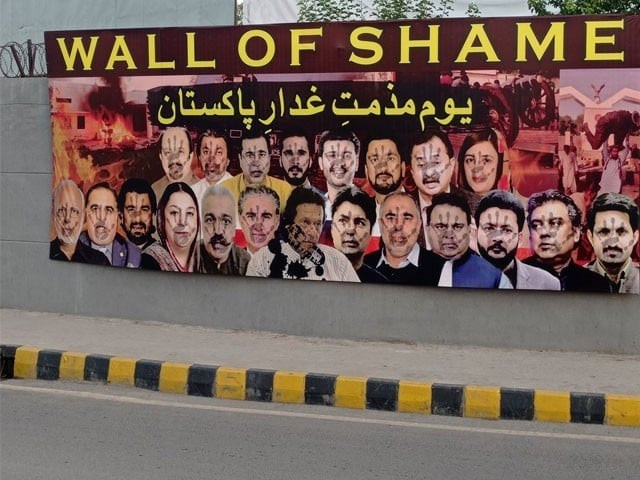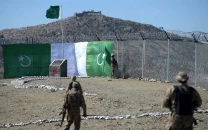‘Walls of shame’ erected against PTI at many places in twin cities
Identity of individuals responsible for erecting this public display of discontent overnight remains undisclosed

In a shocking display of public discontent, “walls of shame” have been erected across Islamabad and Rawalpindi, targeting the leadership of the Pakistan Tehreek-e-Insaaf (PTI) party.
The action comes in response to the alleged role of PTI leaders in incidents of vandalism targeting public and military installations that took place on May 9 following the arrest of party chief Imran Khan.
These walls of shame bear banners that read "Wall of Shame" and "Day of Condemnation of Traitors of Pakistan," accompanied by shoe marks on pictures of Khan and other party leaders.
Wall of Shame prepared outside Judicial Complex.
— SalSam 🇨🇦🇶🇦🇬🇧🇵🇸🇵🇰 (@SalsamSays) May 27, 2023
Banners r displayed against @PTIofficial leaders. Slogans calling patriots as "Traitors". Remember who posted banners of "yellow taxi" & throw photos "Sicilian Mafia, PDM + Handlers".#PakistanUnderFascismpic.twitter.com/zrixzsXenB
The twin cities have been inundated with dozens of these banners, prominently displayed along various roads and particularly on Murree Road. The banners, strategically placed overnight, serve as a stark reminder of the public's anger and disappointment towards the PTI leadership.
Despite their visibility, the identity of the individuals responsible for erecting these walls of shame remains undisclosed.
Also read: Ex-PTI MPA among 16 handed over to army for trial
In addition to the roads, banners denouncing PTI leaders can also be seen outside the judicial complex. These banners feature photographs of PTI leaders with the slogan "Condemnation Day of Traitors of Pakistan," further emphasising the public's frustration.
The placement of these banners outside a judicial institution highlights the growing sentiment of discontent, as citizens question the actions of the former ruling party.
On May 9, in an unprecedented show of vandalism, protestors allegedly belonging to the PTI, vandalised public and state properties and even attacked the General Headquarters in Rawalpindi and the Lahore corps commander’s residence.
The attack occurred hours after the paramilitary Rangers arrested PTI chief Imran Khan in the Al-Qadir Trust corruption case – later retitled as National Crime Agency £190 million scandal – on the orders of the National Accountability Bureau, from the Islamabad High Court premises.
The rioting was followed by a harsh crackdown against the former ruling party leaders and workers that still continues.
The army termed the events of May 9 a “dark chapter” and announced its intent to try the protesters under relevant laws, including two military laws — the Pakistan Army Act and Official Secrets Act.
The decision was backed by the National Security Committee (NSC) – the country’s top security panel. It was approved by the federal cabinet wherein it was decided that the protesters who ransacked and vandalised military installations on May 9 would be tried under the Army Act and the Official Secrets Act.



















COMMENTS
Comments are moderated and generally will be posted if they are on-topic and not abusive.
For more information, please see our Comments FAQ